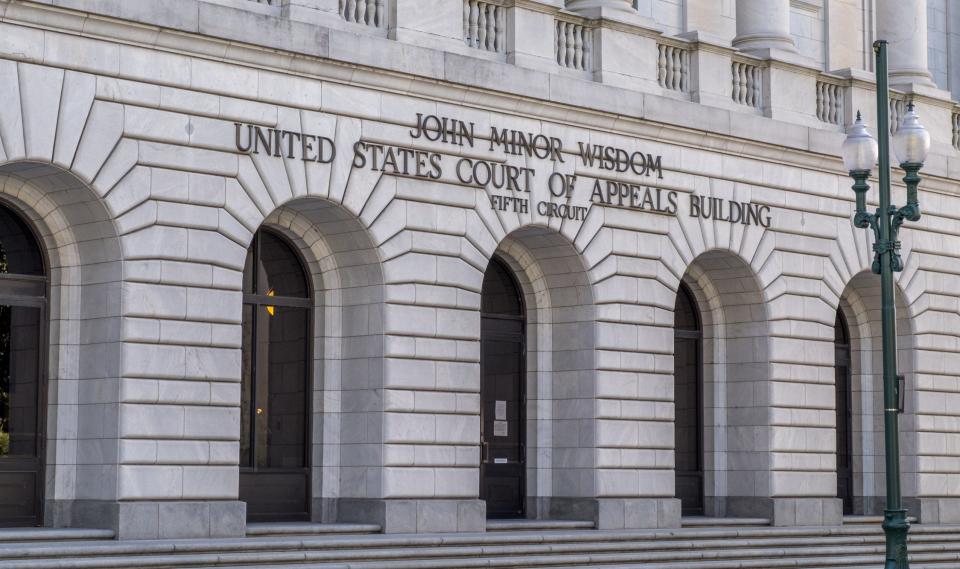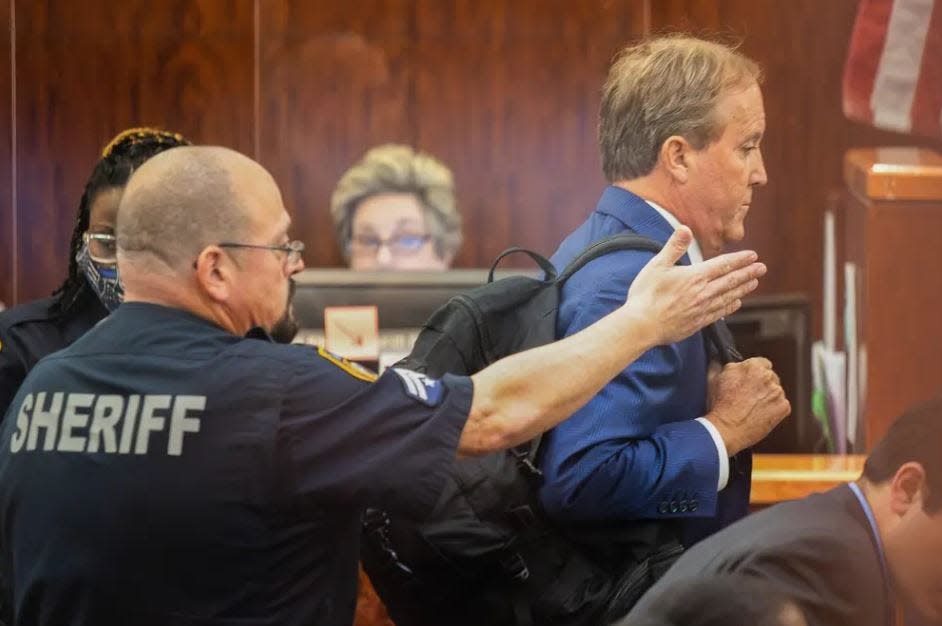AG Ken Paxton says Texas 'did not make any concession' during hearing on Senate Bill 4
- Oops!Something went wrong.Please try again later.
Attorney General Ken Paxton is defending his office after the state's solicitor general during a court hearing Wednesday on Texas' immigration policy said the state might have "gone too far" with Senate Bill 4, a policy that would authorize state and local law enforcement officers to arrest, detain and deport people suspected of entering the U.S. in Texas from Mexico without legal authorization.
"Texas did not say SB4 'went too far'—just the opposite," Paxton said in a statement Wednesday night. "In context, it was clear that the matter of whether Texas went too far in light of the Arizona v United States SCOTUS decision was the question before the Court.
"As counsel explained, Texas has gone as far as Arizona v United States allows."
During the hearing Wednesday before the 5th U.S. Circuit Court of Appeals in New Orleans, Texas Solicitor General Aaron Nielson defended the state's immigration policy — which is being challenged by the U.S. Justice Department and civil rights groups — as being complementary to federal law and needed to secure the Texas-Mexico border as federal authorities have been unable to adequately address the record influx of migrants.
"What Texas has done here is they have looked at the Supreme Court's precedent, and then they have tried to develop a statute that goes up to the line of Supreme Court precedent that allows Texas to protect the border," Nielson said in referencing a U.S. Supreme Court decision from 2012, known as the Arizona case, which set precedent and parameters of states' rights over border issues, an area of law that has historically been under the total jurisdiction of the federal government.
In making his pitch on behalf of Texas, Nielson walked the three-judge appeals court panel through the state's concern over the law being blocked by federal courts before it was ever allowed to take effect as scheduled March 5 and addressed judges' questions on the migrant removal provisions called for in SB 4.
Nielson said Wednesday it is going to be the court's decision to make whether Texas had overextended its authority in trying "to develop a law that goes up to the edge, but no further" than what is allowed under the Arizona ruling.
"Now, to be fair, maybe Texas went too far," Nielson said, which later ignited Paxton's ire as news outlets, he charged, misconstrued the statement as an admission of guilt. "And that's the question this court is going to have to decide. But that's the context of which we are here."
More: Construction is under way on Texas' border military base camp in Eagle Pass. What we know.
Gov. Greg Abbott in December signed SB 4 into law, which codifies a series of penalties for anyone suspected of crossing into Texas from Mexico other than through an international port of entry. The penalties range from a Class B misdemeanor to a second-degree felony. The law would allow the police in the state to arrest migrants suspected of entering the U.S. illegally and would authorize judges who perform magistrate duties to deport them to Mexico, regardless of whether Mexico is their country of origin, or face stiffer criminal penalties for noncompliance.

The U.S. federal government, Mexico's government, El Paso County and civil rights groups — including the ACLU of Texas, Texas Civil Rights Project American Gateways and Las Americas Immigrant Advocacy Center — have all decried SB 4 as a clear overstep that will exacerbate discrimination against Black and Hispanic people.
"Mexico will continue to categorically reject any measure that allows state or local authorities to carry out immigration control tasks, detain or return Mexican or foreign people to Mexican territory," the country's Ministry of Foreign Affairs said in a statement after Wednesday's hearing. "These types of laws, in addition to generating international friction, are discriminatory and violate human rights."
More: Did Texas 'go too far' with SB4 border bill? Appeals court weighs case; injunction holds.
The appeals court took no action Wednesday on whether to continue or lift its temporary block on SB 4. The hearing was meant to address Texas' appeal of a temporary hold a federal judge in Austin issued on the law in February that has kept it from taking effect. Judge David Ezra of the U.S. District Court for the Western District of Texas ruled that the law should be blocked from taking effect while the courts consider the constitutional challenges against it.
"Several factors warrant an injunction," Ezra wrote in his February ruling. "First, the Supremacy Clause, and Supreme Court precedent affirm that states may not exercise immigration enforcement power except as authorized by the federal government."
A 5th Circuit panel on March 2 initially overturned the District Court's hold on SB 4 and allowed the U.S. Supreme Court about a week to decide if it wanted to intervene in the case or let the law go into effect.

On March 4, the Supreme Court, via an order by Justice Samuel Alito, took up the case and left the law on hold until it reversed course March 19 and lifted the hold, allowing SB 4 to take effect for roughly nine hours. The 5th Circuit later that night reinstated the injunction and again put SB 4 on pause as its legal merits and the state's appeal on the ongoing hold are considered.
In defending Nielson's comments, Paxton said news outlets had peddled a false narrative out of the solicitor general's remark and that Texas should be able to defend its law even if that means overturning the Arizona precedent.
"If Arizona preempts even state laws that criminalize the very border crossings that federal law also makes unlawful, Arizona should be overruled," Paxton said. "Texas did not make any concession."
This article originally appeared on Austin American-Statesman: Texas AG Ken Paxton says SB 4 doesn't go 'too far'

